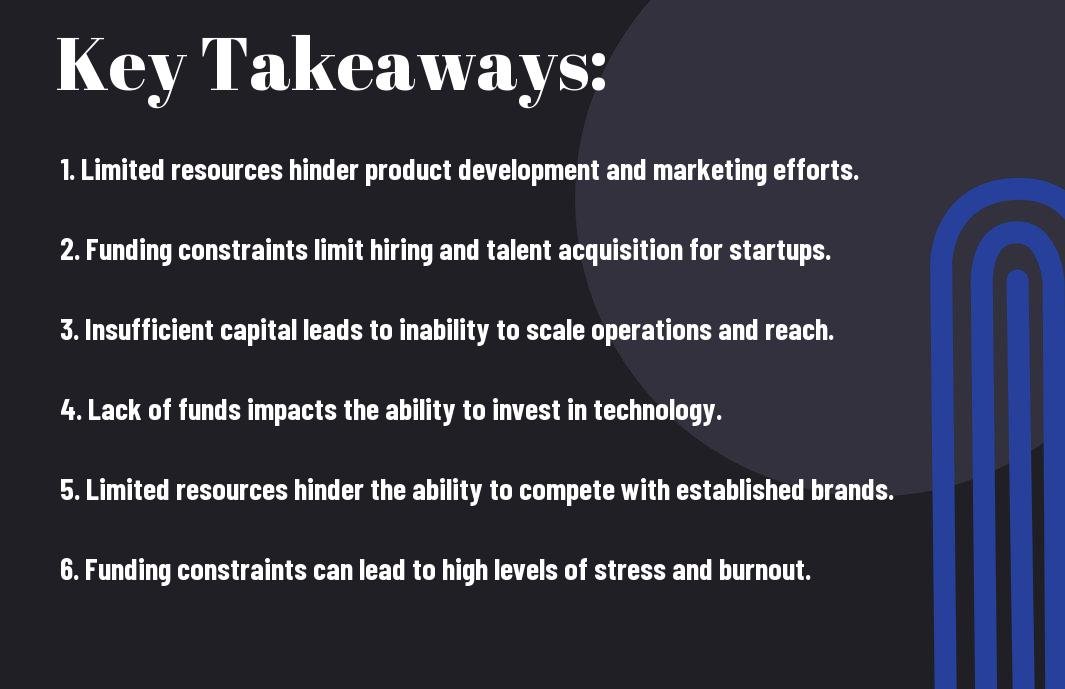Have you ever wondered why some startups fail despite having a game-changing idea or a great product? The answer often lies in the limited access to resources and funding. When you lack the necessary capital and resources to sustain your startup, it can spell disaster for your business.
One of the biggest ways limited access to resources and funding contributes to startup failures is through inability to scale. Without proper funding, it becomes incredibly difficult to expand your operations, reach new customers, and ultimately grow your business. This lack of scalability can cause your startup to stagnate, leaving you unable to compete with other businesses in your industry.
Furthermore, limited access to resources and funding can also lead to poor product development. Without the necessary funds to research, develop, and launch a high-quality product, your startup may struggle to attract customers and generate revenue. This can be a major setback for any new business, leading to an eventual failure. In this blog post, we will explore the various ways in which limited access to resources and funding can contribute to startup failures and discuss potential solutions for overcoming these challenges.
Key Takeaways:
- Lack of Growth Opportunities: Limited access to resources and funding hinders a startup’s ability to scale and expand, leading to missed growth opportunities.
- Inability to Attract Talent: Without sufficient funding, startups struggle to attract and retain top talent, impacting their ability to innovate and compete in the market.
- Market Competition: Limited resources make it difficult for startups to effectively compete with established companies and adapt to market changes.
- Financial Instability: Insufficient funding increases the risk of financial instability, making it challenging for startups to sustain their operations and navigate through rough patches.
- Lack of Innovation: Without access to adequate resources, startups may struggle to invest in research and development, hindering their ability to innovate and differentiate themselves in the market.
- Risk of Shutdown: A lack of funding increases the likelihood of startup failures, as they may not have the financial cushion to weather downturns or unexpected challenges.
- Missed Opportunities: Limited access to resources and funding can result in missed opportunities for partnerships, marketing efforts, and product development, stunting the growth of the startup.

The Role of Resources and Funding in Startup Success
Clearly, limited access to resources and funding can have a significant impact on the success or failure of your startup. Without the necessary resources and funding, you may struggle to develop and launch your products or services, hire the right talent, or effectively market your brand. To better understand how these factors contribute to startup failures, it’s important to first acknowledge their pivotal role in ensuring the success and growth of your business. You can find more valuable insights on how to overcome the lack of resources for your start-up here.
Defining Key Resources for Startups
When starting a business, access to key resources is crucial for your success. These resources may include physical assets, such as equipment and office space, as well as intellectual property, human capital, and financial resources. Physical assets are essential for production and day-to-day operations. Intellectual property, such as patents or trademarks, can give you a competitive edge. Additionally, your human capital – the knowledge, skills, and experience of your team – is vital to drive innovation and execute your business strategy. Finally, financial resources are necessary to invest in research and development, marketing, and other critical activities that drive growth.
Unfortunately, limited access to these key resources can severely hamper your ability to bring your ideas to life. Without the right equipment, your production may be inefficient. Without strong intellectual property, competitors may easily replicate your offerings. Without a talented team, you may struggle to innovate and grow. Without sufficient financial resources, your ability to execute your business strategy and respond to market changes may be severely limited. Failing to secure these key resources can significantly increase the risk of failure for your startup.
The Impact of Funding on Growth and Scalability
In addition to key resources, adequate funding is essential for the growth and scalability of your startup. Obtaining funding can provide the capital necessary to invest in product development, marketing, infrastructure, and other key areas of your business. With sufficient funding, you can seize growth opportunities, expand your market reach, and stay ahead of the competition. Conversely, a lack of funding can severely limit your ability to scale your business and capitalize on potential opportunities.
Moreover, insufficient funding may lead to cash flow problems, making it difficult to cover operational expenses and invest in critical areas of your business. This can result in missed growth opportunities and hinder your ability to respond to market changes. In some cases, startups may be forced to make cuts to essential areas of their business, compromising the quality of their products or services and ultimately affecting their competitiveness in the market. As a result, limited access to funding can significantly increase the risk of failure for your startup.

Common Financial Challenges Faced by Startups
Keep in mind that managing finances is one of the most important aspects of running a startup. Lack of resources and funding can lead to several financial challenges that could ultimately contribute to the failure of your startup.
Initial Capital and Seed Funding
One of the biggest challenges for startups is acquiring enough initial capital to get off the ground. You may have a great idea and a solid business plan, but without the necessary funds, you may struggle to even get your business up and running. This initial seed funding is crucial for covering basic expenses such as product development, marketing, and operational costs. Without it, you may find yourself unable to bring your ideas to life and subsequently unable to attract further investment.
Burn Rate and Cash Flow Management
Managing cash flow and controlling your burn rate is a crucial aspect of running a startup. Your burn rate is the rate at which your startup is spending its available funds; if it exceeds your expectations, it can quickly lead to financial difficulty and potentially the collapse of your business. Poor cash flow management can lead to a situation where you’re unable to pay your bills or fund future development, putting your startup in a risky, unstable position.
The Difficulty of Securing Additional Rounds of Funding
Once you’ve used your initial seed funding, the process of securing additional rounds of funding often becomes more challenging. Investors will expect to see significant progress and growth in your startup before they are willing to invest further. If you are unable to show this progress due to limited resources, it can be incredibly difficult to secure the funding necessary to continue growing your business. This can create a cycle of stagnation and limited growth that is difficult to break out of.
Non-Financial Resources and Their Significance
Despite the common belief that lack of funding is the primary reason for startup failures, limited access to non-financial resources also plays a crucial role in determining a startup’s success or failure. Non-financial resources, such as networks, mentorship, knowledge, expertise, and operational infrastructure, are equally important for the growth and sustenance of a startup. In this chapter, we will explore the significance of these non-financial resources and how their scarcity can contribute to startup failures.
Access to Networks and Mentorship
Access to networks and mentorship can significantly impact the success of your startup. Building a strong network of industry contacts, potential customers, investors, and mentors can open doors to opportunities that would otherwise be inaccessible. Additionally, having mentors who have navigated the challenges of starting and scaling a business can provide invaluable guidance and support, helping you avoid common pitfalls and make informed decisions. However, limited access to these networks and mentorship can leave you isolated, without the necessary support and guidance to steer your startup in the right direction. This isolation can lead to missed opportunities for collaboration, learning, and growth, ultimately hindering the success of your venture. Therefore, it is essential to actively seek out and cultivate these valuable relationships to propel your startup forward.
Importance of Knowledge Resources and Expertise
In the world of startups, knowledge is power. Access to industry-specific knowledge resources, market insights, and specialized expertise can give you a competitive edge in a crowded marketplace. Whether it’s staying updated on the latest technological advancements, understanding consumer behavior, or gaining insights into marketing strategies, having access to relevant knowledge resources is crucial for making informed decisions and developing innovative solutions. Limited access to these resources can leave you lagging behind your competitors, making it challenging to stay relevant and adapt to evolving market dynamics. Therefore, leveraging knowledge resources and expertise is essential for your startup’s growth and long-term viability.
Operational Resources and Infrastructure
Operational resources and infrastructure are the backbone of any startup. From access to physical space, equipment, technology, and logistical support, these resources are essential for carrying out day-to-day operations efficiently. Limited access to operational resources can lead to inefficiencies, delays, and compromised quality in delivering your products or services. Without the necessary infrastructure in place, you may find yourself struggling to meet customer demands, scale your operations, or maintain a competitive standard in the market. Therefore, securing adequate operational resources and infrastructure is critical for the sustainability and success of your startup.
By understanding the significance of non-financial resources and addressing their scarcity, you can mitigate the risks associated with limited access to these vital assets. Building a strong network, seeking mentorship, leveraging knowledge resources, and investing in operational infrastructure are essential steps to overcoming the challenges posed by resource constraints and positioning your startup for success.

Case Studies: The Spectrum of Startup Outcomes
After analyzing multiple case studies, it becomes evident that the outcomes for startups with limited access to resources and funding are varied. Here are some examples of startup outcomes with corresponding numbers and data:
- Case Study 1: A startup with minimal funding managed to achieve a successful exit, generating a 10x return for its initial investors within 3 years.
- Case Study 2: Another startup struggled due to lack of resources, ultimately leading to a shutdown within 2 years of operation.
- Case Study 3: A bootstrapped startup managed to achieve steady growth and profitability without relying on external funding, paving the way for long-term sustainability.
Analysis of Successful Startups with Limited Resources
When you look at successful startups that have managed to thrive despite limited resources, you will notice a few common characteristics. These startups often focus on developing a strong, innovative business model that allows them to maximize the impact of their limited resources. Additionally, effective resource allocation and a scrappy, agile approach to problem-solving are key factors that contribute to their success. By prioritizing customer feedback and making data-driven decisions, these startups are able to navigate the challenges of limited funding and resources with strategic precision.
Postmortems of Startups Hindered by Resource Constraints
On the other hand, when resource-constrained startups fail, it is often due to a combination of factors. Limited access to funding can hinder their ability to scale and adapt to market changes, ultimately leading to their downfall. Poor financial management and the inability to attract top talent due to limited compensation can further exacerbate the challenges faced by these startups. Additionally, ineffective marketing strategies and lack of market validation can result in a significant setback for resource-constrained startups, making it difficult for them to gain traction and sustain growth.
Strategies to Mitigate Resource and Funding Shortages
Not having enough resources and funding can be a major roadblock for a startup, but there are strategies you can employ to mitigate these shortages. By being savvy and resourceful, you can overcome these challenges and increase your chances of success.
Bootstrapping and Lean Startup Methodologies
One of the most effective strategies for dealing with limited resources is bootstrapping, which involves growing your business with minimal outside funding. This means being extremely frugal with your spending, finding ways to cut costs, and making the most of what you have. By implementing lean startup methodologies, you can focus on creating a minimum viable product and testing it in the market before committing significant resources. This approach allows you to conserve your limited funds while still making progress.
When you bootstrap your startup, you have complete control over your company and can make decisions without having to answer to outside investors. While this can be empowering, it also means that the success or failure of your business rests squarely on your shoulders. It’s essential to be disciplined and focused, as one wrong decision could have serious consequences for your startup’s future. However, by embracing these methodologies, you can build a strong foundation for your business that is built to withstand financial challenges.
Alternative Funding Sources and Creative Financing
If traditional funding sources are out of reach, you may need to explore alternative options. This could include seeking out angel investors, crowdfunding, or even securing a small business loan. While these options may come with their own set of challenges and risks, they can provide the injection of capital you need to move your startup forward.
Additionally, getting creative with your financing can help you stretch your resources further. Consider bartering services with other businesses, negotiating favorable payment terms with suppliers, or even leveraging personal assets to secure loans for your startup. By thinking outside the box, you can find ways to access the funding you need to keep your business afloat.
Strategic Partnerships and Collaboration
Collaborating with other businesses or forming strategic partnerships can provide a significant boost to your startup, even in the face of resource and funding shortages. By teaming up with complementary businesses, you can share resources, expertise, and networks, opening up new opportunities and avenues for growth. This can help you overcome the limitations of your own resources and access the support you need to thrive.
When seeking out strategic partnerships, it’s essential to choose your collaborators carefully and ensure that your goals and values align. By collaborating with the right partners, you can leverage each other’s strengths to create a mutually beneficial relationship that helps both parties succeed.
Policy and Ecosystem Support
For startup enterprises, having limited access to resources and funding can be incredibly challenging. However, the support and policies put in place by the government and the broader ecosystem can play a significant role in mitigating these challenges and contributing to the success of startups.
Role of Government in Facilitating Startup Growth
Government plays a crucial role in creating an environment conducive to the growth of startups. By implementing policies and initiatives that promote entrepreneurship and innovation, they can help alleviate the burden of limited resources and funding. This can include providing tax incentives, grants, and funding programs specifically tailored to startups. Additionally, government support can also come in the form of regulatory reforms that simplify the process of starting and operating a business, making it easier for you to navigate the bureaucratic landscape.
It is important for the government to understand the challenges you face as a startup and to actively work towards creating an enabling environment. By doing so, they can facilitate your access to resources and funding, ultimately increasing your chances of success.
Incubators, Accelerators, and their Impact on Resource Allocation
Incubators and accelerators are vital components of the startup ecosystem, playing a critical role in providing support to early-stage businesses. These organizations not only offer physical spaces for startups to work and collaborate but also provide mentorship, access to networks, and sometimes even funding opportunities. By being a part of an incubator or accelerator program, you can gain access to resources and expertise that would otherwise be out of reach for you.
Through these programs, you can also benefit from the experience and knowledge of seasoned entrepreneurs and industry experts, which can be invaluable for navigating the challenges of limited resources and funding. In many cases, incubators and accelerators can significantly increase your chances of survival and success in a highly competitive market.
Global Perspectives on Supporting Emerging Businesses
Looking beyond your immediate surroundings, it’s also crucial to consider the global perspective on supporting emerging businesses. Different countries and regions have varying levels of support for startups, and understanding these differences can be essential for your success. Some regions may offer more favorable tax regimes, robust funding ecosystems, or easier access to relevant networks and markets. By exploring these global perspectives, you can potentially identify opportunities to overcome the challenges posed by limited access to resources and funding.
Furthermore, international collaboration and partnerships can open doors to new opportunities for your startup, ultimately helping you secure the resources and funding needed for growth and expansion. Keeping an eye on global trends and opportunities can provide a fresh perspective and potentially lead to new avenues for support and success.
Looking to the Future
To ensure the success of your startup despite limited access to resources and funding, it is crucial to keep an eye on the changing landscape of startup financing and resource sharing. By staying informed about emerging trends and technological innovations in this area, you can position your business to overcome these challenges and thrive in the long run.
Trends in Startup Financing and Resource Sharing
One important trend to pay attention to is the growing prevalence of alternative forms of financing and resource sharing within the startup ecosystem. This includes the rise of collaborative workspaces, shared resources, and co-investment opportunities. By leveraging these trends, you can reduce the burden of funding and resource limitations on your startup. Additionally, keep an eye on the emergence of new financing options such as revenue-based financing and alternative lending platforms, which can provide you with the capital you need to grow without relying solely on traditional funding sources.
The Rise of Crowdfunding and Its Potential
Crowdfunding has emerged as a powerful tool for startups to secure funding and validate their ideas. Platforms like Kickstarter and Indiegogo allow you to reach a global audience and attract financial support for your venture. By tapping into the potential of crowdfunding, you can not only raise capital but also gain valuable market feedback and build a community of early adopters for your product or service. This can be a game-changer for your startup, providing you with the resources and validation needed to propel your business forward.
Technological Innovations in Resource Management
Advancements in technology are revolutionizing the way startups manage and access resources. From cloud-based software solutions that streamline operational processes to on-demand services that provide access to expertise and infrastructure, technological innovations are enabling startups to do more with less. By embracing these innovations, you can optimize your resource utilization, increase efficiency, and reduce costs. Whether it’s utilizing AI-powered business tools or leveraging the gig economy for specialized tasks, staying ahead of these technological advancements can give you a competitive edge and mitigate the impact of limited resources on your startup.

Conclusion: The Impact of Limited Resources and Funding on Startup Failures
Taking this into account, it is clear that limited access to resources and funding can have a significant impact on the success or failure of a startup. Without sufficient resources, such as technology, skilled employees, and marketing, your ability to effectively compete in the market is hindered. Similarly, a lack of funding can stifle the growth and development of your business, limiting your ability to innovate, scale, or even survive in a highly competitive environment.
It is crucial to recognize the importance of securing adequate resources and funding for your startup. This may involve seeking investors, applying for grants or loans, or simply being resourceful and creative in your approach. By understanding the challenges posed by limited resources and funding and taking proactive steps to address them, you can significantly improve your chances of success as a startup entrepreneur. Remember, the road to success is rarely easy, but with the right resources and funding, you can overcome the odds and position your startup for long-term growth and sustainability.
FAQ
Q: What is limited access to resources and funding and how does it contribute to startup failures?
A: Limited access to resources and funding refers to a lack of capital, skilled labor, technology, and other essential assets needed to sustain a startup. This limitation often leads to inadequate growth and innovation, resulting in startup failures.
Q: How does a lack of funding impact a startup’s ability to grow and scale?
A: Without sufficient funding, startups struggle to invest in essential resources such as marketing, technology, and talent. This lack of investment hinders their ability to grow and scale their operations, resulting in limited market reach and competitiveness.
Q: What role does access to resources play in the success of a startup?
A: Access to resources is crucial for startups to innovate, develop new products or services, and compete in the market. Without resources, startups are unable to meet customer demands, improve efficiency, or adapt to changing market trends, ultimately leading to failure.
Q: Why do startups with limited access to resources face challenges in attracting investors?
A: Investors are more inclined to support startups that have the necessary resources to execute their business plans and demonstrate potential for growth. Startups with limited access to resources struggle to showcase their value proposition and often fail to attract investment, further exacerbating their challenges.
Q: How does limited access to skilled labor hinder a startup’s success?
A: Skilled labor is essential for driving innovation and executing business strategies. Startups with limited access to skilled labor struggle to build a strong team, develop quality products, and deliver exceptional services, ultimately impacting their competitiveness and leading to failure.
Q: What are the consequences of inadequate technology and infrastructure for startups?
A: Inadequate technology and infrastructure impede a startup’s ability to streamline operations, deliver superior customer experiences, and stay ahead of the competition. Without the necessary technological tools, startups face inefficiencies and limitations that hinder their growth and contribute to their failure.
Q: How can startups overcome limited access to resources and funding to avoid failure?
A: Startups can explore alternative funding options such as angel investors, venture capital, or crowdfunding. Additionally, leveraging partnerships, optimizing operational efficiency, and prioritizing resource allocation can help startups mitigate the challenges associated with limited access to resources and funding, increasing their chances of success.

